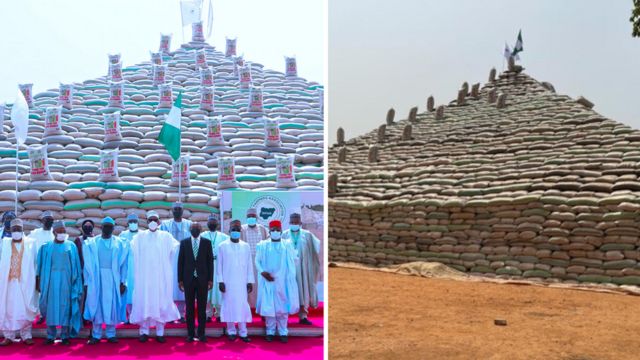Farmers denounce pyramid created with imported rice
By Jeph Ajobaju, Chief Copy Editor
Farmers have dismissed as a lie the one million bags of rice Muhammadu Buhari said he piled up to glorify himself in Abuja on 18 January – with a hungry populace watching in disdain – reconfirming claims that he arranged a false pyramid.
That day, the Peoples Democratic Party (PDP) was quick off the mark to say that Buhari was simply celebrating himself with a “pyramid of lies” as the rice was not produced locally and the quantity not up to one million as he claimed.
Real farmers and other agriculture stakeholders described the event as another political gimmick preparatory to the general election a year from now.
All Farmers Association of Nigeria (AFAN) National President Kabir Ibrahim asked Buhari to explain where the rice and maize in the pyramid were cultivated.
“With the high level of insecurity in the major rice and maize producing states, forcing farmers to keep off farmlands, we need to know where the rice was produced. Who owns the rice and maize?” he asked.
Rice Farmers Association of Nigeria (RIFAN) Pyramid Sub-Committee Chairman Shehu Muazu said the rice was collected from Anchor Borrowers Programme (ABP) beneficiaries under the business partnership of the Central Bank of Nigeria (CBN).
But Ibrahim and others faulted the launch of the CBN and RIFAN rice pyramid.
They said there is nothing to celebrate as a 50kg bag of rice still sells for N24,000 against N8,000 it sold for before Buhari became President in 2015.
__________________________________________________________________
Related articles:
Nigeria’s laziest President, Buhari, jets off again
Rice costs more as importers pay N300b new freight charges
Nigerians reeling from hunger caused by food inflation
__________________________________________________________________
High cost of production
Nigeria is reportedly the largest paddy rice producer in Africa but rice millers grapple with high costs of production and poor access to paddy.
Stakeholders also criticised the exclusion of the Agriculture Ministry and agriculture research institutes from the ABP of the CBN which supports farmers, as reported by The Guardian (Nigeria).
They said part of the rice used to build the pyramid was imported from Cameroon, Benin Republic, Niger, and Togo.
Below are the views of others in the sector collated by The Guardian:
Bello Musa (agriculture expert)
“We await to see a crash in the price of local rice from the present N24,000 to N10,000. We are not unmindful of the fact that we are in an election year and anything is possible.”
Kabir Ibrahim (AFAN National President)
“With the high level of insecurity in the major rice and maize producing states, forcing farmers to keep off farmlands, we need to know where the rice was produced. Who owns the rice and maize?
“The ABP has supported agriculture greatly in financing smallholder farmers but the pyramid is a deceit.
“If we have surplus food as depicted by the pyramids, why do we still have food shortages? Why are the prices still high in the market?”
Alphonsus Inyang (National Palm Produce Association of Nigeria (NPPAN) National President)
“It is unfortunate that the CBN has resorted to showmanship. Instead of it focusing on activities that will ensure sustainable economic development, it has decided to go for quick fixes and things that will earn it applause.
“We keep saying that the money the CBN is spending is development money, managed by the development finance department of the Bank and that they should sit down and work out the best way to spend the money to give the country maximum benefit.
“You don’t spend development money to get applause; you use it to develop the economy, to spread prosperity and to improve livelihoods. But the CBN is more interested in getting people to clap for them.
“That is the reason for the rush for pyramids. Is the CBN telling us that the rice pyramids in Ekiti State were rice cultivated in Ekiti?”
Edwin Uche (Maize Growers, Processors and Marketers Association of Nigeria (MGPMAN) National President)
“The pyramids signify a lot, depending on how you define it. It tells you the level of efforts being put in place to ensure that maize is grown and that the challenges associated with maize farming are being addressed gradually.
“It also shows you that the farmers are working hard to support food security in Nigeria.It is also to motivate people within the value chain that it is possible to attain self-sufficiency in food if we all work together.
“Yes, there are questions about why the pyramids when there is scarcity. Of course, we have to do the pyramids to show the world that we are doing something to address the scarcity.”
Debo Ologunagba (PDP National Publicity Secretary)
The PDP mocked Buhari for staging another “shameful” media stunt to deceive voters in the run up to the 2023 ballot, as contained a statement issued by Ologunagba, reported by The PUNCH.
Nigerians are aware of how the All Progressives Alliance (APC) “create” fake pyramids of rice with sandbags and re-bagged rice stacked on pyramid shaped wooden structures as discovered in an APC state in the South West in 2018, he said.
“There is nothing to celebrate in the APC pyramid of lies in Abuja,” Ologunagba insisted.
“It is rather shameful that APC leaders are again ridiculing … Buhari by making him unveil pyramids of allegedly imported foreign rice which are re-bagged as locally produced, just to create an impression of a boost in local production under his watch.
“If indeed there is a boost in local production of rice as the APC wants Nigerians to believe, how come the price of rice has not come down but continues to soar from about N8,000 per bag which the PDP handed over to the APC in 2015 to about N30,000 per bag today?
“It is on record that the PDP turned the waterland of various states of our nation into huge rice production hubs with farms and mills springing up across the country, leading to a boost in local production, drastic drop in imports and the celebrated affordable prices of food products under the PDP administration.”













